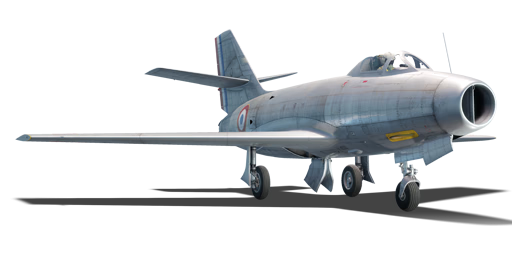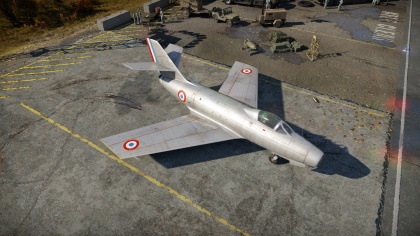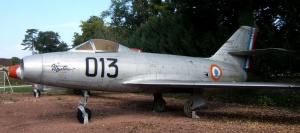Difference between revisions of "M.D.452 IIC"
Bonisducks (talk | contribs) (→External links) (Tag: Visual edit) |
Bonisducks (talk | contribs) m (→Design and Development:) (Tag: Visual edit) |
||
| Line 207: | Line 207: | ||
The M.D.452 Mystere was a swept-wing air superiority fighter developed Dassault Aviation, derived from the M.D.450 Ouragan. The aircraft combined the fuselage of the Ouragan with a new swept-wing, enabling it to reach much faster speeds than it's predecessor. In 1951, the Mystere IIA became the first French-designed plane to break the sound barrier, in a controlled dive<ref name=":0">http://www.airvectors.net/avmyst.html</ref>. Later on, the M.D.452 IIC would enter service with the French Air force, and serve until 1957, when it was relegated to training duties<ref name=":1">https://www.dassault-aviation.com/en/passion/aircraft/military-dassault-aircraft/md-452-mystere-ii/#</ref>. | The M.D.452 Mystere was a swept-wing air superiority fighter developed Dassault Aviation, derived from the M.D.450 Ouragan. The aircraft combined the fuselage of the Ouragan with a new swept-wing, enabling it to reach much faster speeds than it's predecessor. In 1951, the Mystere IIA became the first French-designed plane to break the sound barrier, in a controlled dive<ref name=":0">http://www.airvectors.net/avmyst.html</ref>. Later on, the M.D.452 IIC would enter service with the French Air force, and serve until 1957, when it was relegated to training duties<ref name=":1">https://www.dassault-aviation.com/en/passion/aircraft/military-dassault-aircraft/md-452-mystere-ii/#</ref>. | ||
| − | ====== Design and Development | + | ====== Design and Development ====== |
The M.D.452 Mystere was originally designed as an advanced variant of the preceding M.D. 450 Ouragan, with a new wing section and engine. In 1950, Marcel Dassault, the head of the Dassault aviation firm, signed a contract to produce an M.D. 450 Ouragan with a new thinner wing section<ref name=":1" />. The aircraft had a wing swept back at 30 degrees compared to the Ouragan's 14 degrees, and was powered by a license-built version of the Rolls-Royce Nene. During tests, the aircraft showed significantly better climb rate and top speed, being capable of reaching transonic speeds. After four prototypes, the M.D.452IIA was developed, carrying four 20mm M50 (Hispano-derived) cannons and the Rolls-Royce Tay engine. On October 28th 1951, a Mystere IIA Became the first French aircraft to break the sound barrier, in a controlled dive<ref name=":0" />. | The M.D.452 Mystere was originally designed as an advanced variant of the preceding M.D. 450 Ouragan, with a new wing section and engine. In 1950, Marcel Dassault, the head of the Dassault aviation firm, signed a contract to produce an M.D. 450 Ouragan with a new thinner wing section<ref name=":1" />. The aircraft had a wing swept back at 30 degrees compared to the Ouragan's 14 degrees, and was powered by a license-built version of the Rolls-Royce Nene. During tests, the aircraft showed significantly better climb rate and top speed, being capable of reaching transonic speeds. After four prototypes, the M.D.452IIA was developed, carrying four 20mm M50 (Hispano-derived) cannons and the Rolls-Royce Tay engine. On October 28th 1951, a Mystere IIA Became the first French aircraft to break the sound barrier, in a controlled dive<ref name=":0" />. | ||
However, the M.D.452 IIA failed to enter service, as it was rapidly replaced by the M.D. 452IIB and IIC. The IIB and IIC retained the wing and fuselage of the IIA, while featuring a new intake design and a pair of 30mm DEFA cannons in place of the IIA's four M50s<ref name=":0" />. The new IIC was re-engined with a SNECMA Atar turbojet, capable of producing 25 kn. The M.D.452 IIC would later go on to enter service, serving between 1954 and 1963. | However, the M.D.452 IIA failed to enter service, as it was rapidly replaced by the M.D. 452IIB and IIC. The IIB and IIC retained the wing and fuselage of the IIA, while featuring a new intake design and a pair of 30mm DEFA cannons in place of the IIA's four M50s<ref name=":0" />. The new IIC was re-engined with a SNECMA Atar turbojet, capable of producing 25 kn. The M.D.452 IIC would later go on to enter service, serving between 1954 and 1963. | ||
| − | ====== Operational Service | + | ====== Operational Service ====== |
In 1954, the French Air service placed an order for 150 M.D.452 IIC aircraft, which were delivered between 1954 and 1957<ref name=":1" />. These aircraft carried a SNECMA Atar 101-D (producing 29 kn)<ref>https://www.thisdayinaviation.com/tag/md-452/</ref>, but were otherwise identical to the IIC prototypes. In total, 171 Dassault Mysteres were built, including prototypes of the IIA, IIB and IIC variants. By the time of the last deliveries, the aircraft was already being relegated to advanced training duties; the rapid pace of aviation technology during the 1950s led to the aircraft rapidly becoming obselete<ref name=":0" />. The last M.D. 452 IIC was retired from training duties in 1963, after 9 years of service with the French Air Force. | In 1954, the French Air service placed an order for 150 M.D.452 IIC aircraft, which were delivered between 1954 and 1957<ref name=":1" />. These aircraft carried a SNECMA Atar 101-D (producing 29 kn)<ref>https://www.thisdayinaviation.com/tag/md-452/</ref>, but were otherwise identical to the IIC prototypes. In total, 171 Dassault Mysteres were built, including prototypes of the IIA, IIB and IIC variants. By the time of the last deliveries, the aircraft was already being relegated to advanced training duties; the rapid pace of aviation technology during the 1950s led to the aircraft rapidly becoming obselete<ref name=":0" />. The last M.D. 452 IIC was retired from training duties in 1963, after 9 years of service with the French Air Force. | ||
Revision as of 15:05, 12 November 2020
Contents
| This page is about the French jet fighter M.D.452 IIC. For the other version, see M.D.452 IIA. |
Description
The M.D.452 Mystere IIC pre-production is a rank V French jet fighter
with a battle rating of 8.7 (AB/SB) and 8.3 (RB). It was introduced in Update 1.77 "Advancing Storm".
General info
Flight performance
The MD.452 IIC is something of a jack of all trades. Its flight performance is balanced, if a bit slow to accelerate. The roll rate is excellent at medium to high speeds (550 - 900 km/h), giving the aircraft many options for evasive manoeuvres, and although energy-bleeding, the turn rate is good against most enemies. The two fast-firing 30 mm DEFA canons also compose tremendous firepower, if used with suitable ammunition.
| Characteristics | Max Speed (km/h at 0 m - at sea level) |
Max altitude (metres) |
Turn time (seconds) |
Rate of climb (metres/second) |
Take-off run (metres) | |||
|---|---|---|---|---|---|---|---|---|
| AB | RB | AB | RB | AB | RB | |||
| Stock | 1,035 | 1,027 | 13000 | 26.3 | 26.9 | 32.9 | 31.1 | 800 |
| Upgraded | ??? | 1,044 | ??.? | 24.8 | ??.? | 40.0 | ||
Details
| Features | |||||
|---|---|---|---|---|---|
| Combat flaps | Take-off flaps | Landing flaps | Air brakes | Arrestor gear | Drogue chute |
| ✓ | ✓ | ✓ | ✓ | X | X |
| Limits | ||||||
|---|---|---|---|---|---|---|
| Wings (km/h) | Gear (km/h) | Flaps (km/h) | Max Static G | |||
| Combat | Take-off | Landing | + | - | ||
| 1108 | 450 | 650 | 650 | 450 | ~11 | ~5 |
| Optimal velocities (km/h) | |||
|---|---|---|---|
| Ailerons | Rudder | Elevators | Radiator |
| < 620 | < 700 | < 740 | N/A |
Engine performance
| Engine | Aircraft mass | |||||
|---|---|---|---|---|---|---|
| Engine name | Number | Empty mass | Wing loading (full fuel) | |||
| SNECMA Atar 101D3 | 1 | 5,900 kg | 241 kg/m2 | |||
| Engine characteristics | Mass with fuel (no weapons load) | Max Takeoff Weight | ||||
| Weight (each) | Type | 7m fuel | 20m fuel | 24m fuel | ||
| 1,050 kg | Axial-flow turbojet | 6,308 kg | 7,067 kg | 7,300 kg | 10,500 kg | |
| Maximum engine thrust @ 0 m (RB / SB) | Thrust to weight ratio @ 0 m (100%) | |||||
| Condition | 100% | WEP | 7m fuel | 20m fuel | 24m fuel | MTOW |
| Stationary | 2,911 kgf | N/A | 0.46 | 0.41 | 0.40 | 0.28 |
| Optimal | 3,178 kgf (1,100 km/h) |
N/A | 0.46 | 0.41 | 0.40 | 0.28 |
Survivability and armour
- 40 mm Bulletproof glass in front of the pilot
- 13.5 mm Steel plate around the bottom of the cockpit, front and rear
- 13.5 mm Steel plate behind the pilot
Armaments
Offensive armament
The M.D.452 IIC is armed with:
- 2 x 30 mm DEFA 541 cannons, belly-mounted (150 rpg = 300 total)
The two cannons are arranged in the belly portion of the fuselage exiting the aircraft just behind the pilot's location. Each is armed with the same amount of ammunition, which means that both guns will fire together until empty.
This aircraft is the first of the French jets to use 30 mm DEFA canons, which are (as of Update 1.95) the best 30 mm guns in the game, with the highest shell velocity, rate of fire, and gun reliability. While the default ammunition is underwhelming, the "air targets" ammunition will shred enemy fighters with a single or a couple of shells. Heavier targets might need 3-5 hits to loose a wing.
Suspended armament
The M.D.452 IIC can be outfitted with the following ordnance:
- Without load
- 2 x 500 lb AN-M64A1 bombs (1,000 lb total)
- 2 x 1,000 lb AN-M65A1 Fin M129 bombs (2,000 lb total)
- 38 x SNEB type 23 rockets
The ordnance of the M.D.452 IIC gives it the ability to engage ground targets, but limits its manoeuvrability greatly and should generally not be used in Air RB except as a late game last resort. In mixed battles, the SNEB rockets can be an excellent anti-tank weapon for CAS, and the aircraft inserts well in the French BR 8.3 line-up.
Usage in battles
The M.D.452 IIC is generally more manoeuvrable than most other contemporary aircraft it faces, the only ones you would have a tough time turning with at this battle rating would be any of the Sabres. Since its roll rate is comparable to the Sabre's once the "New Boosters" modification is installed, the option of turnfighting becomes available, although speed will be bled at a relatively high rate. Still, like the predecessors of the Mystère II, boom & zooming should remain the first choice in engagements. Control stiffening doesn't appear under around 1,000-1,050 km/h, and devastating armament will take out an enemy target in a single pass. Furthermore, top speed in level flight is slightly below average, justifying even more that tactic.
Overall, the Mystère IIC should be considered as buffed Ouragan/Barougan, increasing drastically the top speed, armament, and manoeuvrability parameters.
Modules
| Tier | Flight performance | Survivability | Weaponry | ||
|---|---|---|---|---|---|
| I | Fuselage repair | Offensive 30 mm | |||
| II | New boosters | Compressor | Airframe | SBC-17 | |
| III | Wings repair | Engine | New 30 mm cannons | LBC-25 | |
| IV | G-suit | Cover | Matra SNEB | ||
Pros and cons
Pros:
- Excellent armament of 2 x 30 mm DEFA cannons (higher muzzle velocity and RoF than the ADEN cannon)
- High roll rate, matches the Sabre's roll rate with "New boosters" modification installed
- Good turn rate between 550 kph and 800 kph
- Decent climb rate
- Payloads can include bombs or rockets
- More effective air brake than its predecessors
- A lot of ammo for only 2 x 30 mm DEFA cannons
- Guns being mounted under the nose makes it easy to head on planes upside down
- DEFA cannons can easily down a plane with 1 to 3 HE rounds striking
Cons:
- Slightly slower to other contemporary aircraft
- Poor horizontal energy retention compared to its predecessors
- Fragile; a few hits of enemy fire will make controlling the aircraft more difficult, forcing a return to base for repairs
History
The M.D.452 Mystere was a swept-wing air superiority fighter developed Dassault Aviation, derived from the M.D.450 Ouragan. The aircraft combined the fuselage of the Ouragan with a new swept-wing, enabling it to reach much faster speeds than it's predecessor. In 1951, the Mystere IIA became the first French-designed plane to break the sound barrier, in a controlled dive[1]. Later on, the M.D.452 IIC would enter service with the French Air force, and serve until 1957, when it was relegated to training duties[2].
Design and Development
The M.D.452 Mystere was originally designed as an advanced variant of the preceding M.D. 450 Ouragan, with a new wing section and engine. In 1950, Marcel Dassault, the head of the Dassault aviation firm, signed a contract to produce an M.D. 450 Ouragan with a new thinner wing section[2]. The aircraft had a wing swept back at 30 degrees compared to the Ouragan's 14 degrees, and was powered by a license-built version of the Rolls-Royce Nene. During tests, the aircraft showed significantly better climb rate and top speed, being capable of reaching transonic speeds. After four prototypes, the M.D.452IIA was developed, carrying four 20mm M50 (Hispano-derived) cannons and the Rolls-Royce Tay engine. On October 28th 1951, a Mystere IIA Became the first French aircraft to break the sound barrier, in a controlled dive[1].
However, the M.D.452 IIA failed to enter service, as it was rapidly replaced by the M.D. 452IIB and IIC. The IIB and IIC retained the wing and fuselage of the IIA, while featuring a new intake design and a pair of 30mm DEFA cannons in place of the IIA's four M50s[1]. The new IIC was re-engined with a SNECMA Atar turbojet, capable of producing 25 kn. The M.D.452 IIC would later go on to enter service, serving between 1954 and 1963.
Operational Service
In 1954, the French Air service placed an order for 150 M.D.452 IIC aircraft, which were delivered between 1954 and 1957[2]. These aircraft carried a SNECMA Atar 101-D (producing 29 kn)[3], but were otherwise identical to the IIC prototypes. In total, 171 Dassault Mysteres were built, including prototypes of the IIA, IIB and IIC variants. By the time of the last deliveries, the aircraft was already being relegated to advanced training duties; the rapid pace of aviation technology during the 1950s led to the aircraft rapidly becoming obselete[1]. The last M.D. 452 IIC was retired from training duties in 1963, after 9 years of service with the French Air Force.
Media
See also
Links to the articles on the War Thunder Wiki that you think will be useful for the reader, for example:
- reference to the series of the aircraft;
- links to approximate analogues of other nations and research trees.
External links
References:
| France jet aircraft | |
|---|---|
| Fighters | M.D.450B Ouragan · M.D.450B Barougan · M.D.452 IIA · M.D.452 IIC · Mystere IVA · Super Mystere B2 |
| ▄F-86K · ▄F-100D · ▄F-8E(FN) | |
| Mirage IIIC · Mirage IIIE · Milan · Mirage 5F · Mirage 2000C-S4 · Mirage 2000C-S5 · Mirage 2000-5F · Mirage 4000 | |
| Mirage F1C · Mirage F1C-200 · Mirage F1CT | |
| Strike aircraft | ▄F-84F · F-84F IAF · ▄F-84G-26-RE |
| Etendard IVM · Super Etendard · Alpha Jet E | |
| Jaguar A · Jaguar E · Mirage 2000D-R1 · Mirage 2000D-RMV | |
| Bombers | S.O.4050 Vautour IIA · Vautour IIA IDF/AF · S.O.4050 Vautour IIB · S.O.4050 Vautour IIN · S.O.4050 Vautour IIN (late) |
| Belgium | ▄Meteor F Mk.8 · ▄Mirage 5BA · ▄F-104G · ▄F-16A · ▄F-16AM |
| Netherlands | ◘Sea Hawk Mk.50 · ◘Hunter F.6 |






